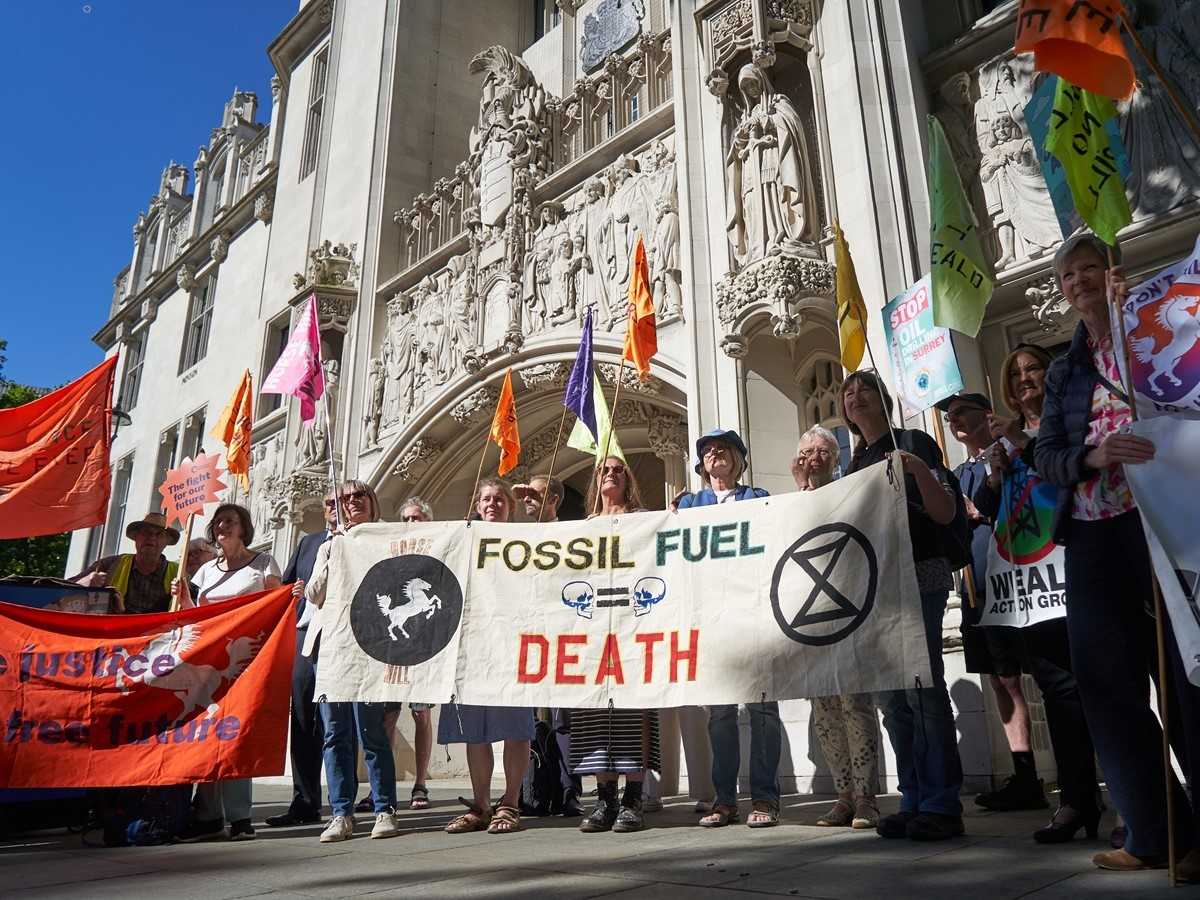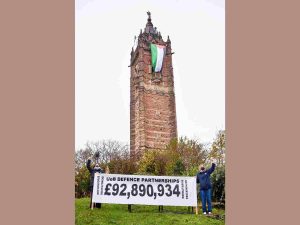A landmark decision by the Supreme Court on Thursday 20 June has raised major barriers to all new fossil fuel projects across the UK, including the proposed new coal mine in Cumbria and the Rosebank oil field in the North Sea.
Horse Hill: unlawful planning permission
The Supreme Court has ruled that it was unlawful for Surrey County Council to grant planning permission for oil production to UK Oil and Gas (UKOG) at its Horse Hill site, near Gatwick, as it failed to assess the impact of downstream greenhouse gas (GHG) emissions.
Not only does today’s Supreme Court ruling destroy UKOG’s plans to drill for up to 3.3m tonnes of crude oil for 20 years at its Horse Hill site, near Gatwick Airport, but also has huge implications for all future fossil fuel projects in the UK.
Neither the Cumbrian coal mine in Whitehaven nor the Rosebank oil field in the North Sea sought consent for their projects. Nor did they provide any information on downstream emissions in their environmental statements. Both projects are the subjects of legal challenges.
The groundbreaking judgment follows a legal challenge brought by Extinction Rebellion climate crisis campaigner and former Surrey resident Sarah Finch, on behalf of the Weald Action Group.
Years of direct action over fossil fuels
Finch’s legal fight was part of a wider campaign of opposition, launched by Weald Action Group and supported by local Extinction Rebellion activists, who regularly carried out direct actions at Horse Hill, including scaling and occupying one of the oil rigs on site, locking themselves onto the main gate, slow walking and climbing onto the roofs of oil tankers entering the site and staging lock-ons at the gate.
Finch launched her case in 2019 and argued that, under the correct interpretation of the Environmental Impact Assessment (EIA) Regulations 2017, environmental impact assessments must take into account downstream emissions caused by burning extracted oil.
Today’s ruling marks the end of Finch’s long running legal campaign which she took to the Supreme Court after three Appeal Court judges were split over the lawfulness of Surrey County Council’s decision to grant permission for 20 years of oil drilling and production.
What the ruling said
The ruling makes clear that downstream emissions must be taken into consideration in the environmental assessments of fossil fuel projects, dismissing both the High Court’s ruling that refining the oil could break the chain of causation and the Court of Appeal ruling which left the issue to the planning authorities.
The court stated this would be “a recipe for unpredictable, inconsistent and arbitrary decision-making” adding that this inconsistency “would be all the more regrettable when issues relating to climate change and the extent to which disclosure of information about GHG emissions should be required are becoming more and more salient in policy-making and public debate”.
The ruling also emphasised the importance of public participation as a way of increasing the democratic legitimacy of environmental decision, and serving an educational function. As Lord Leggatt summarised: “You can only care about what you know about.”
The Court also said that while national policy on oil extraction must be taken into account, it said that did not mean a planning authority “has to ignore [the] adverse effects on climate.”
The majority judgment also stated that climate change “is a global problem precisely because there is no correlation between where GHGs are released and where climate change is felt”.
The majority ruling also rejected the argument that resulting GHG emissions are “outwith the control of the site operators with the Court stating that it found that such emissions “are entirely within their control” in that they could choose not to extract the oil.
Grassroots action on fossil fuels does work
Local Extinction Rebellion campaigner reverend Helen Burnett said the ruling is a testament to the power of grassroots organising.
I feel so much gratitude for the perseverance of the few, the ones who, in spite of ridicule and opposition, have gathered at the site for over five years to raise awareness of Horse Hill and shale oil extraction.
This verdict sends encouragement and hope to grassroots organisers everywhere that we can tell the truth about the climate emergency and demand that the impact of fossil fuel extraction be truly acknowledged as a current and future harm.
We have held a space at the Horse Hill gate monthly for years, honouring this little patch of land as a place where nature can flourish and now Horse Hill will be remembered because of the sheer determination and perseverance against all odds of those who just kept turning up whatever the weather to walk, to stand witness, to occupy by camping, to lock on, to block oil tankers, to make speeches, to pray. This is a day of jubilation and a day to remember all those who have raised their voices against the monolith of the oil and gas industries.
Campaigner Sarah Finch said:
I am absolutely over the moon to have won this important case. The Weald Action Group has always believed it was wrong to allow oil production without assessing its full climate impacts, and the Supreme Court has shown we were right.
This is a welcome step towards a safer, fairer future. The oil and gas companies may act like business-as-usual is still an option, but it will be very hard for planning authorities to permit new fossil fuel developments – in the Weald, the North Sea or anywhere else – when their true climate impact is clear for all to see.
Featured image via Extinction Rebellion




